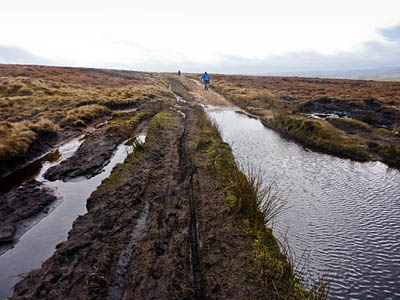A national park authority has pledged extra cash to tackle problems caused by off-road vehicle use in its area.
The Peak District authority members agreed to allocate an extra £100,000 over the next two years to fund a full-time post and cover extra hours of legal work necessary.
The national park’s bosses said the money would be used to speed up production of route-action plans and create the capacity to potentially deal with more Traffic Regulation Orders to conserve the landscape’s natural beauty and wildlife.
It would also help resolve problems faster, involve volunteers more and improve engagement with user groups and local communities while contributing to the work of partners in monitoring and reporting illegal use.
The authority pointed out that, although 4×4 use is often called ‘off-roading’, many unasphalted countryside tracks in the national park can legally be used by 4×4s and trail bikes.
Christopher Pennell, who chairs the authority’s audit, resources and performance committee, said: “We are in a better position than ever before to tackle the impact of motorists on unsurfaced routes in the national park.
“We recognise there are strong feelings amongst local communities and other countryside users about the damage and disturbance caused on certain routes.”
Members voted in favour of making the work a priority, despite facing cuts of £1.8m over four years from its £7.8m budget.
Mr Pennell added: “We are here to protect the national park and its special qualities. It’s our job to consider the impact of 4×4 and trail bikes using unsurfaced tracks on the environment, local communities and on the quiet enjoyment of the national park.
“We want people to enjoy this much loved landscape for the benefits of recreation but in ways that don’t harm the environment.
“Unfortunately the impact of some 4×4s and trail bikes on the condition of unsurfaced routes can make it difficult and sometimes dangerous for walkers, cyclists and horseriders to use them.”
Eleven public speakers addressed the meeting at which members made their decision.
Six groups represented local and national motoring interests and five groups spoke for local communities and other countryside users including horseriders and walkers.
A further period of public consultation on the revised strategy will take place before work begins. The Peak authority said this is to allow any new issues not previously raised to be considered.
It added the national park authority will continue to work in partnership with responsible 4×4 and trail bike user groups, the police, highways authorities, the Local Access Forum, and others including horseriders, walkers and cyclists.

Ben
08 December 2011Here's a novel thought, why not invest some resources on route maintenance and concentrate legal efforts on those breaking the law, not on those legally and responsibly enjoying byways and UCR's.
The environmental argument doesn't really hold true since the majority of pollution emissions in national parks inevitably result from vistors travelling in private vehicles on surfaced routes. Carbon emissions resulting from responsible vehicle use on unsurfaced roads will no doubt be a tiny proportion of the overall emissions total.
Another thought for you, many people who object to the use of vehicles on unsurfaced roads also object to equestrian users, cyclists and walkers. Once the 4x4's and trail bikes are gone which user group will be the next target?
What is required is a united approach to preserving responsible access to the countryside for everyone to enjoy.